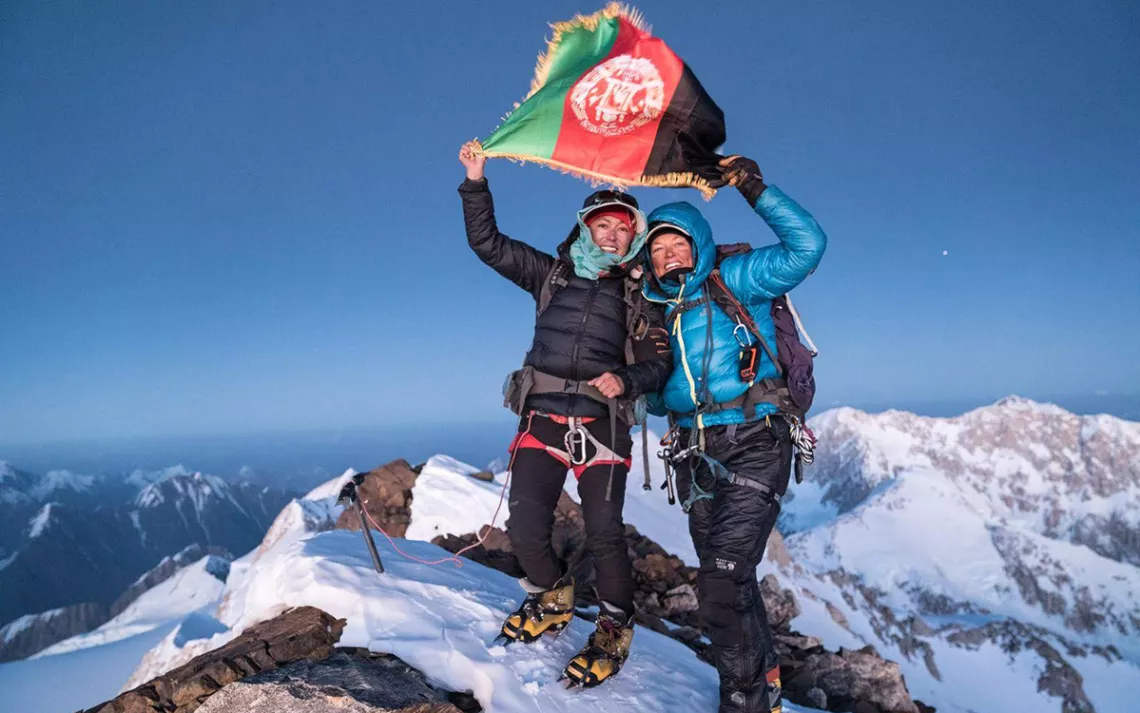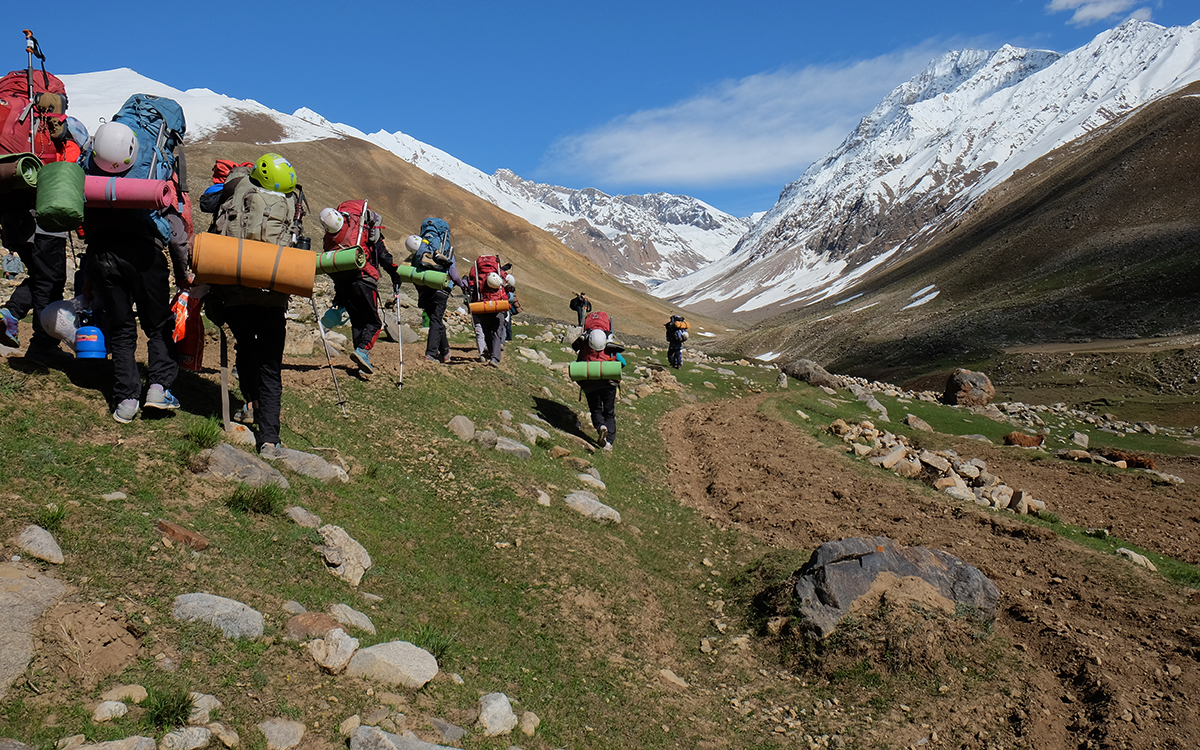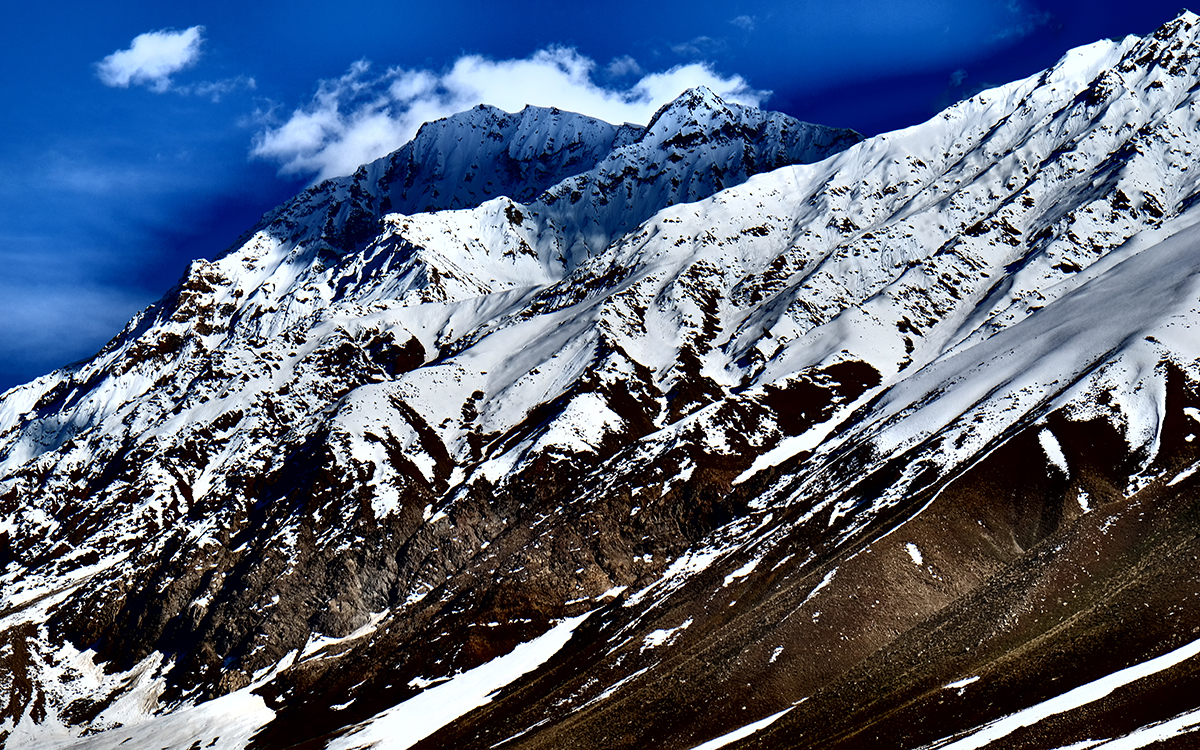Hanifa Yousoufi on Her Historic Climb up Mt. Noshaq
The 24-year-old is the first Afghan woman to summit the country’s tallest peak

Hanifa Yousoufi at the summit with Vibeke Sefland, a Norwegian member of the expedition | Photos courtesy of Ascend Athletics
On August 10, Hanifa Yousoufi became the first Afghan woman to summit Afghanistan’s tallest peak, 24,580-foot Mt. Noshaq. The nearly month-long expedition was organized by Ascend: Leadership Through Athletics, a program in Kabul that trains young Afghan women to mountain climb. The 24-year-old had been mountain climbing with the organization for little more than two years when she made the ascent. Sierra interviewed Yousoufi by phone in early October. Yousoufi does not speak English; Ascend program coordinator Freshta Ibrahimi served as translator. The interview has been edited for length and clarity.
*
Sierra: Why did you join Ascend Athletics?
Hanifa Yousoufi: I like sports, and Ascend Athletics is a great opportunity for the girls.
How did your life change once you started Ascend?
I became more social. I found friends. I had some fears in the past, but now I feel very confident. Before I started Ascend, I didn’t know how to read or write, but now I am taking classes to learn.
What is your role at Ascend?
I am program assistant. I organize all the gear. I help the girls pack for the trips and when they get back, I am responsible for making sure they put the gear in order. I also lead rock climbing classes.
When did you first start thinking about summiting Mt. Noshaq?
Two years ago. It was our last trip for the year in Ascend, and we went to Bamyan. Marina [Ascend’s executive director] told us who had been selected for the Noshaq trip. From that time I’ve been thinking about summiting Mt. Noshaq.
How did you prepare for the expedition?
We had to run 15 kilometers [about 9 miles] once a week. We did the fitness training and weight lifting. There was a volunteer who came to Ascend, and she took the Noshaq team to Bamyan for hiking and running.


Did you feel you were fit enough to climb the mountain?
When I saw the mountain, I thought I wasn’t ready for it, but I tried hard.
What were some of the risks involved?
It was really cold up there. Everywhere was full of the snow, and it was windy. The rock climbing was also risky. The rocks were very loose and dangerous.
Did you find the climb technically difficult?
Yes. It was not easy for me to walk wearing crampons. You need to be very confident walking with the crampons up there.
Before this expedition, how high had you been?
My highest elevation before Noshaq was 5,500 meters [18,045 feet].
Did you feel any symptoms of elevation sickness?
Yes, I had altitude sickness in Camp Two, and they had to bring me down to Camp One. I rested a night in Camp One, and then went back to Camp Two.
You had two other teammates who were not able to summit with you because of altitude sickness. How did you feel when you knew you were going to attempt the summit without them?
I was sad because I wanted to make it as a group and I hoped that the other girls could also be with me up there on the mountain. But when it was decided that I should go alone, I was also happy that still an Afghan girl is trying for this mountain.
Where there security risks?
Right before the trip, there was fighting in Zebak. The charter had to fly over that place so they canceled our flight, and we ended up having to fly to another city and then drive for the whole day. But I was confident about the arrangements that Ascend made. Mostly I was thinking about Noshaq, not the Taliban. Once I was on the mountain, I felt safe.
How many people were on the expedition?
Thirteen. There were four Afghan girls and the rest were expats. We had 42 porters.
Describe to me the day you summited the peak.
After we had breakfast, we left the camp at 9 A.M. When we were close to the top, I was very tired, and the expedition leader told me, “If you can’t go up, you’re in a good position. You are very high. You can take your country’s flag out, and we will take a picture with that. You will be recorded.” They said, “That is the peak. Do you want to go?” And I said yes. We walked very slowly. We met the summit at 7:10 P.M. I was very, very happy. I felt that all Afghan girls summited this mountain.
Once you came down from the mountain, did a lot of people in Afghanistan hear about it?
The people in the village where the hotel was all heard that an Afghan girl had summited Mt. Noshaq. They wanted to bring me flowers and say congratulations, but we came back to the hotel when it was dark, and we left early in the morning to fly back to Kabul.
Freshta Ibrahimi: We kept it secret until Hanifa was back to safety, back to her house, and she and her family could talk about how she wanted to be in the media. Did she want to use her full name or no? It’s a big security issue here. She came back on Tuesday, and we published it in the news on Saturday. Hanifa had four days to think about it, but there were already journalists contacting Marina, and the national media in Afghanistan wanted to cover it. So, yeah, it made the news, but not TV, just the radio and Facebook. That was to protect her privacy. Media outlets asked her to come on the TV, but she did not accept.
So you chose to use your full name. Why?
Because I wanted people to know my complete name. I am proud of myself, but also, I wanted it to be clear that an Afghan woman summited the peak.
Has most of the attention been positive?
It has mostly been positive. I don’t have access to social media, but my friends were telling me how people were posting in the comments. They said some people were negative, but most of them were very positive.
Why was it important to summit Mt. Noshaq?
Summiting Mt. Noshaq was important for me because I wanted to be a voice for Afghan women and show that Afghan women can do positive things in our country. I was also motivated for myself. I went to Nepal [in the fall of 2017]. When I was introduced to the Nepali or other international mountaineers, they were very shocked that there are Afghan women mountaineers. They were very happy and excited to meet us. I was encouraged and inspired and wanted to be a mountaineer.
Has anything changed for you now that you have summited Mt. Noshaq?
No, but I want to see changes in the future. I want to see more Afghan women become mountaineers, and I want to help train those that want to be mountaineers as well as for there to be more organizations that work to train women in mountaineering.
Do you have a new peak you want to climb?
To be honest, I don’t know very many peaks, but I know about the highest peak of the world, Everest. In the future, I want to summit Everest.
 The Magazine of The Sierra Club
The Magazine of The Sierra Club



